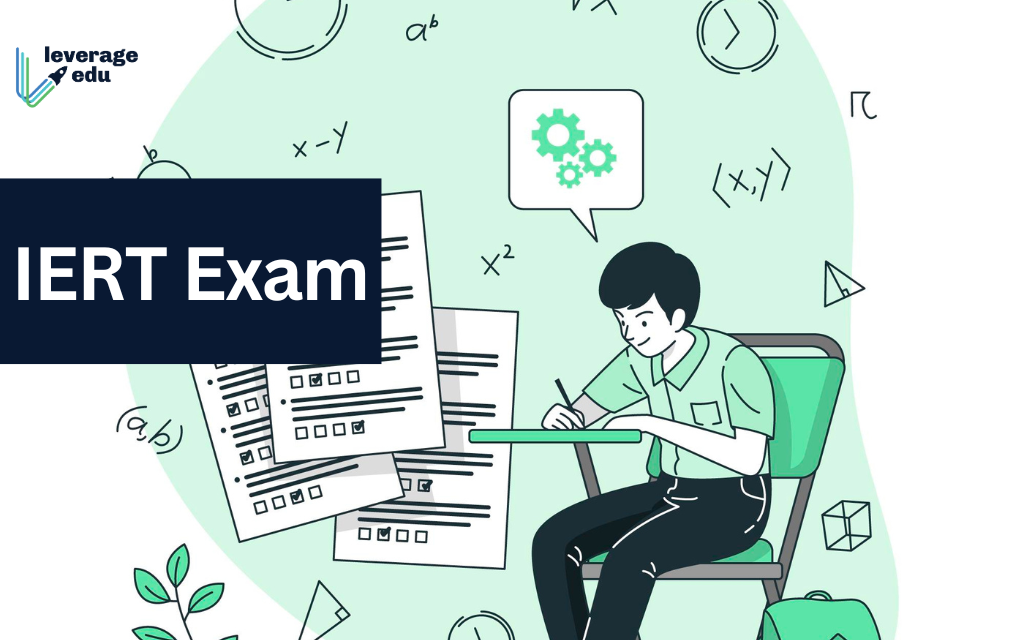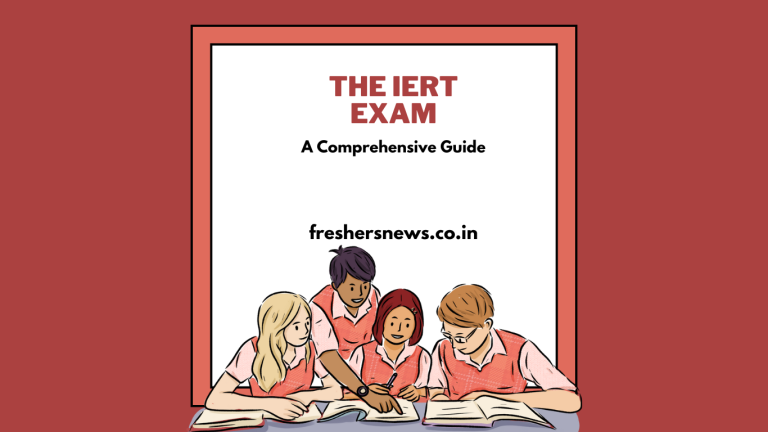Introduction
Are you thinking of pursuing engineering studies at the prestigious institute in Prayagraj? Look no further than the Institute of Engineering and Rural Technology exam! This blog will equip you with all the essential information to navigate the IERT confidently. Let’s dive in. Here, we are discussing The IERT Exam: A Comprehensive Guide.
Here we are talking about The IERT Exam: A Comprehensive Guide:

Eligibility criteria
- Nationality-> You must be an Indian citizen or hold a valid PIO/OCI card.
- Educational Qualification-> For undergraduate programs, you must have passed class 12th with Physics, Chemistry, and Mathematics as compulsory subjects from a recognized board. The minimum aggregate mark requirement varies depending on the program and reservation category.
- Age Limit-> There is no specific age limit, but individual programs may have their restrictions.
Exam pattern for IERT
This exam typically comprises two parts:
- Part 1-> Physics, Chemistry, and Mathematics (objective-type questions)
- Part 2-> English Language and Comprehension (objective-type questions)
Important dates for IERT
Stay updated with key dates to ensure timely application and preparation.
- Notification release-> November – December
- Application window After notification release.
- The last date for applications is January – February.
- Admit card download-> week before the exam
- Exam date-> April or May
- Result declaration-> After the exam
How to prepare for IERT
- Understand the syllabus and examination pattern.
It is essential to have a clear concept regarding “what to study?” & “How it will be asked?”
- Create a study plan.
Once you have the perfect materials, you must create a study plan. This will assist you in remaining on track and making sure that you cover all of the crucial topics. Your study layout has to be realistic and achievable, and it is necessary to plan practical time for every analysis of a new topic and revise what you have already learned.
- Self-Study or Coaching.
The most common questions in students’ minds are how to prepare for the IERT exam and whether to take coaching. The best decision will be a combination of both. Now, IERT is not something you have included in your school curriculum. Therefore, coaching will guide your preparation by providing relevant study materials and tests. Then, you can solve exercises and review materials to study independently.
- Work on fundamentals.
Developing fundamental concepts should be given top priority before moving on to IERT exam-level questions. So, focus on studying basic concepts and practice easy questions first. Then, gradually move on to higher-level questions.
- Practice lots of questions.
After completing a topic, practice asking as many questions as possible. Move from lower to higher-difficulty questions. Reviewing the concepts a few times through practice can help you prepare for the IERT exam.
- Analysis of test
A practice test is a simulation of the actual test. So, as the exam approaches, taking practice tests regularly should be a part of your IERT preparation strategy. Additionally, it is equally important to analyze your simulations and identify your weaknesses.
- Practice regularly
One of the best approaches to put together for the IERT examination is to practice answering questions regularly. You can do this by solving exercise papers and taking mock tests. Many unique exercise papers and mock tests are available online and in books.
- Stay motivated.
It is essential to be stable, active, and motivated throughout your preparation.
- Focus on your weak areas.
As you start answering questions, you will perceive your weak areas. Once you know your weak areas, you can focus your research on these topics. You will additionally need to get additional exercise material for these topics.
About the syllabus of the IERT exam in list form
Part 1
Physics
- Mechanics-> laws of motion, work, power, energy, momentum, circular motion, gravitation, and simple harmonic motion.
- Heat and Thermodynamics-> Kinetic Theory, Calorimetry, Heat Transfer, and the Laws of Thermodynamics.
- Optics-> ray optics, wave optics, interference, diffraction, polarization.
- Electricity and Magnetism-> Electrostatics, electric current, magnetism, electromagnetic induction, AC circuits.
- Modern Physics-> Nuclear Physics, Atomic Physics, and Semiconductor Physics.
Chemistry
- Atomic Structure-> Periodic table, electronic configuration, chemical bonding.
- States of Matter-> solids, liquids, gases, solutions, and collative properties.
- Chemical Reactions-> Stoichiometry, Chemical Equilibrium, Kinetics, Acids and Bases, Redox Reactions.
- Organic Chemistry-> Hydrocarbons, Functional Groups, and Reactions of Organic Compounds.
- Inorganic Chemistry-> Important Elements and Their Compounds; Coordination Chemistry.
Mathematics
- Algebra-> number system, basic operations, exponents, logarithms, quadratic equations, inequalities, permutations and combinations, and complex numbers.
- Calculus-> Differentiation, integration, applications of derivatives and integrals.
- Coordinate Geometry-> Lines, circles, parabolas, hyperbolas, three-dimensional geometry.
- Trigonometry-> ratios, identities, equations, and applications.
- Mensuration-> Areas and volumes of geometrical shapes.
- Statistics-> measures of central tendency and dispersion, probability distributions, sampling.
Part 2
English Language and Comprehension
- Reading comprehension-> passages with understanding, inference, vocabulary, and grammar questions.
- Grammar-> tenses, parts of speech, subject-verb agreement, sentence structure, punctuation.
- Vocabulary-> synonyms, antonyms, idioms, phrasal verbs, word formation.
- Verbal reasoning-> analogies, critical thinking, problem-solving skills.
Which books do you prefer for the IERT exam
Based on the General Syllabus
- Physics
- H.C. Verma: Concepts of Physics (for in-depth understanding)
- D.C. Pandey: The Physics Galaxy (for practice and problem-solving)
- Chemistry
- R.C. Mukherjee, Fundamentals of Physical Chemistry (for theoretical concepts)
- N.Awasthi, Organic Chemistry (for organic chemistry knowledge)
- NCERT Chemistry textbooks (for foundational understanding)
- Mathematics
- R.D. Sharma, Objective Mathematics (for comprehensive coverage)
- Arihant Experts: I.E., Irodov’s Problems in General Physics (for advanced problem-solving)
- NCERT mathematics textbooks (for core concepts)
- English Language and Comprehension:
- Wren & Martin, High School English Grammar & Composition (for grammar rules)
- R.S. Aggarwal: Verbal Reasoning (for practice and strategies)
- Reading comprehension passages from newspapers, magazines, and online sources (for improving reading skills)
Common mistakes to avoid in the IERT exam
- Not analyzing the examination pattern, questions, and syllabus-> it is essential to make a clear concept regarding the study program and which topics to focus on.
- Not managing time effectively-> Time management is essential in any competitive exam.
- Not practicing regularly-> One of the excellent methods to put together for the IERT examination is to practice answering questions regularly.
- Making common mistakes-> In any competitive exam, it is crucial to concentrate and keep away from making careless mistakes.
- Not focusing on weak areas-> As you practice answering questions, you will become aware of your weak areas.
FAQs
What are the steps after the IERT exam?
- Shortlisting based totally on examination scores;
- Counseling/GD/PI
- Final advantage list
Mention if there are any reservations for specific categories of candidates in the IERT selection process.
Yes, the Government of India offers reservations for eligible candidates belonging to:-
- Scheduled Castes (SCs),
- Scheduled Tribes (STs),
- Other Backward Classes (OBCs),
- Persons with Disabilities (PwDs),
- Economic Weaker Sections.
What are the scholarship possibilities available for IERT students?
IERT provides scholarship schemes to worthy and deserving college students primarily based on educational performance, financial need, and categories. Some examples are benefit scholarships, need-based scholarships, scholarships for SC/ST/OBC students, and scholarships subsidized by external organizations.
What are the hostel services at IERT?
IERT provides separate hostel amenities for boys and girls, including furnished rooms, mess facilities, pleasing rooms, laundry services, wifi connectivity, and medical facilities. The hostel prices and allocation methods are subject to precise regulations.
What are the career chances after graduating from IERT?
Graduates from IERT have a strong record of securing placements in reputed agencies and authority groups and pursuing more significant education. The institute’s placement actively assists college students with resume building, interview preparation, and connecting them with conceivable employers.
Conclusion
In conclusion, qualifying for the IERT entrance examination requires a blend of strategic preparation, innovative exploration, and unwavering determination. By understanding the examination pattern, syllabus, and common mistakes, you can enhance your chances of success; remember, regular practice, time management, and a positive attitude are the quintessential qualities in your journey. Embrace the challenges, show off your potential, and believe in your capability to make your IERT dream a reality. So, step forward, unleash your knowledge

